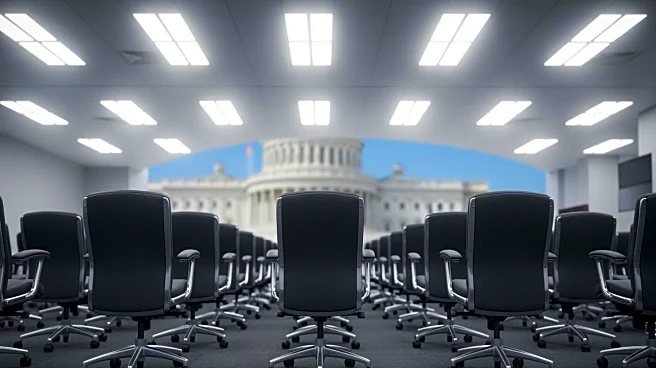What's Happening?
The federal government shutdown, now in its 14th day, has led to significant disruptions as President Trump and his budget chief, Russ Vought, take unprecedented control over federal operations. The Office
of Management and Budget (OMB) has been granted rare authority to determine which programs continue and which are cut, affecting the federal workforce significantly. Essential services such as Social Security, Medicare, Medicaid, and federal student loans continue to operate, along with food assistance programs like SNAP and WIC. However, many federal employees, including those in health, education, and infrastructure protection, have been furloughed or laid off. The shutdown stems from Congress's failure to pass the annual appropriations bills by the October 1 deadline, as Democrats demanded a deal to preserve expiring health care funds related to the Affordable Care Act. The situation is exacerbated by the Republican-led House's refusal to negotiate until the government is reopened.
Why It's Important?
This shutdown is notable for its impact on the federal workforce and the restructuring of government priorities. President Trump's administration is using the shutdown to advance its agenda, including military funding and immigration policies, while cutting jobs in other sectors. The actions taken by the OMB under Vought's leadership have been criticized as illegal and are facing court challenges. The shutdown affects data collection and economic policy decisions, as federal data gathering on prices, job market, and other metrics halts. The broader significance lies in the potential long-term changes to federal operations and the precedent set for future shutdowns, where executive power may be used to reshape government functions.
What's Next?
The shutdown is expected to continue as political leaders remain at an impasse. The Republican House Speaker has welcomed the OMB's actions, while Democrats have vowed to challenge the administration in court. The situation may lead to further legal battles over the legality of the workforce reductions and the administration's authority to redirect funds. The shutdown's resolution will depend on negotiations between Congress and the administration, with potential impacts on public policy and government operations.
Beyond the Headlines
The shutdown highlights ethical and legal concerns regarding the use of executive power to influence federal operations. The restructuring of the workforce raises questions about the balance of power between the executive branch and Congress, and the potential for future administrations to use similar tactics. The cultural impact includes the portrayal of government officials in media, as seen in President Trump's AI-generated video depicting Vought as a 'grim reaper.' This reflects broader societal debates about government efficiency and the role of federal employees.









